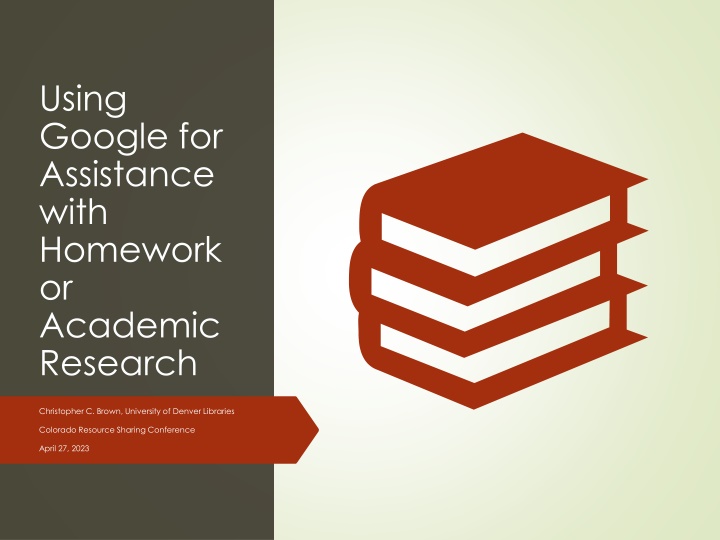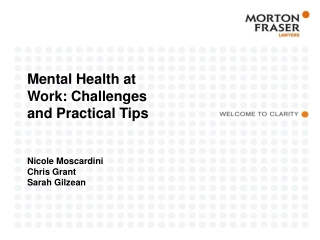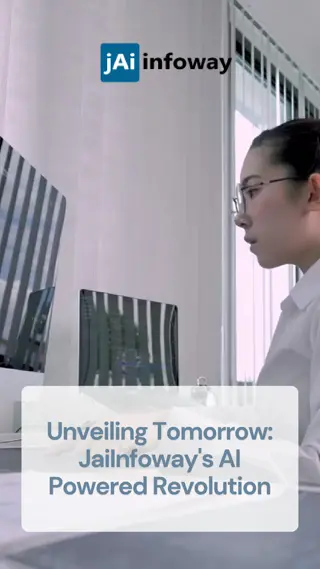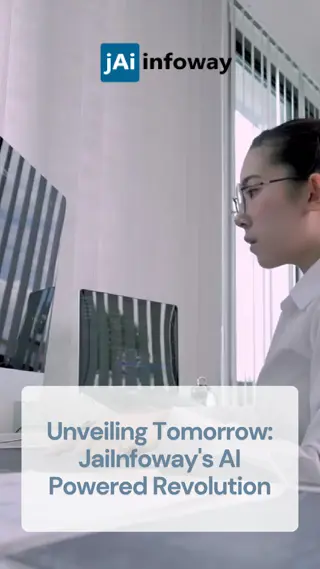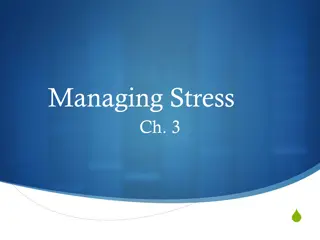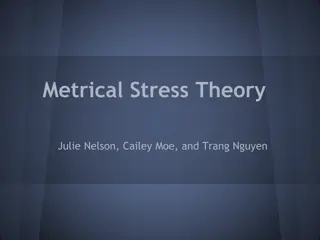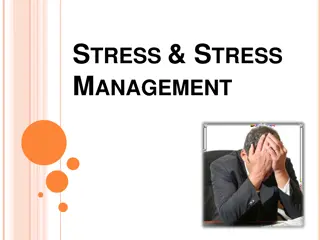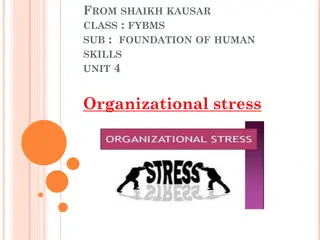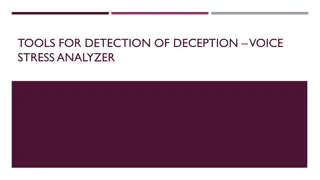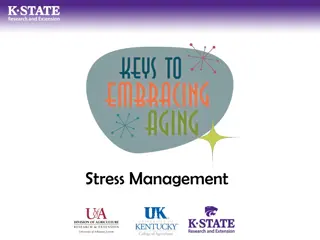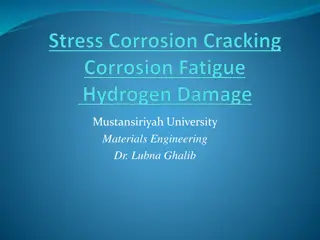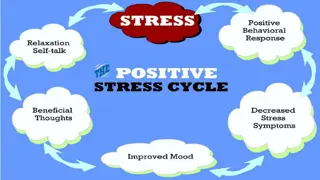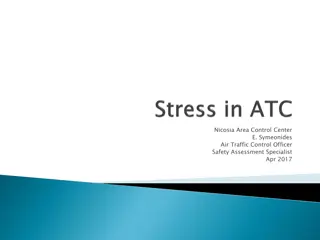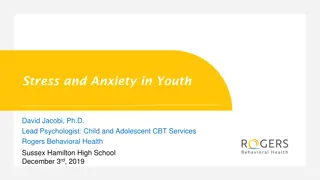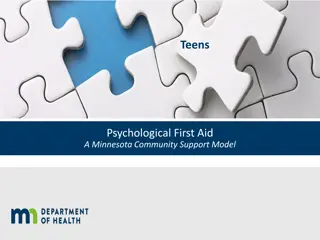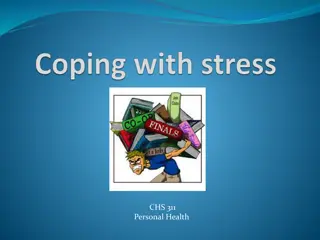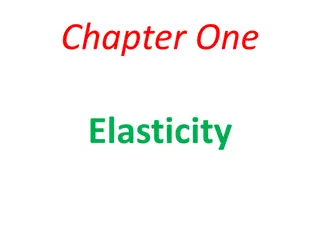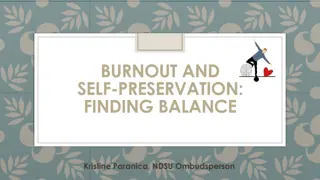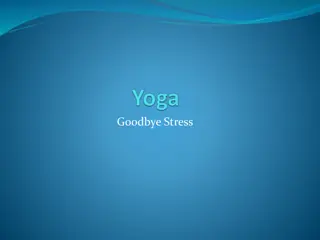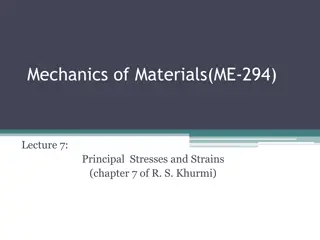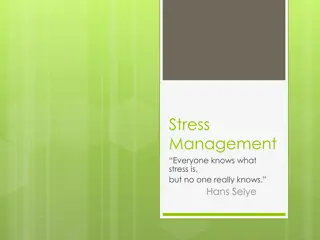Managing Stress for a Better Tomorrow
Addressing the impact of chronic stress on health and wellness, this presentation by Kristen Dickerson covers various aspects of stress, including types, symptoms, management strategies, and its effects on physical and mental well-being. The content delves into acute and chronic stress, the current global situation, and practical tips for mindfulness and teleworking. Learn about the classification of stress, common stressors, and ways to recognize and cope with stress-related symptoms.
Download Presentation

Please find below an Image/Link to download the presentation.
The content on the website is provided AS IS for your information and personal use only. It may not be sold, licensed, or shared on other websites without obtaining consent from the author.If you encounter any issues during the download, it is possible that the publisher has removed the file from their server.
You are allowed to download the files provided on this website for personal or commercial use, subject to the condition that they are used lawfully. All files are the property of their respective owners.
The content on the website is provided AS IS for your information and personal use only. It may not be sold, licensed, or shared on other websites without obtaining consent from the author.
E N D
Presentation Transcript
Using Google for Assistance with Homework or Academic Research Christopher C. Brown, University of Denver Libraries Colorado Resource Sharing Conference April 27, 2023
Abstract Most of us use Google for everyday life searching. Librarians sometimes tell users to stay away from search engines and rely solely on subscription databases. This presentation will show how Google can help students of all ages with homework or academic research. We will show how Google Web can be leveraged to discover primary sources for materials in many disciplines, how Google Scholar can be integrated with library database holdings to provide depth of searching unparalleled in library databases, and how Google Books can do what library catalogs are unable to do: search the full text of books with a high degree of relevancy.
Early Google Timeline First version of the search engine at Stanford in 1996 Company Founded in 1998 Went public in 2004 Google Scholar beta in 2004 Google Books launched in 2004
Googles Privacy Issues Data Leaks Cookies Tracking Google & Government Google Chrome Gmail
Google Easter Eggs [hidden surprises] Alex Trebek: https://www.google.com/search?q=alex+trebek Wizard of Oz: https://elgoog.im/wizard-of-oz/ Cat: https://www.google.com/search?q=cat Dog: https://www.google.com/search?q=dog Legally Blonde: https://www.google.com/search?q=legally+blonde Mars 2020: https://www.google.com/search?q=mars+2020 Juneteenth: https://www.google.com/search?q=juneteenth Christmas: https://www.google.com/search?q=christmas
This Presentation isnt about all that: It s about using Google s tools to help students. Google Web Google Scholar Google Books
Overview of the Three Googles Overlapping at Times GS GW GB Note: this graphic does not represent the actual Google architecture. It shows that different features are foregrounded in different environments.
Google Web: How to leverage it for academic purposes Primary source materials (government documents, international materials, technical reports, company policies, etc.) Locating these with site-specific searching (domain searching; TLD searching) Examples: site:gov.ng domestic staffing site:state.gov country reports human rights site:undp.org development indicators climate change site:state.co.us marijuana regulation filetype:pdf site:gob.mx water statistics filetype:pdf
Using Google Advanced Search Features to Search for Primary Source Materials Federal Government site:gov State Governments site:state.co.us site:colorado.gov Local Governments site:denvergov.org site:ci.denver.co.us Foreign Governments Need Top-Level Domain (TLD) strategies
Google Web Advanced Search Examples site:jp bullet trains site:go.jp bullet trains Refine search to PDF format: site:go.jp bullet trains filetype:pdf site:mx "transportation policy" Limit to government sites: site:gob.mx "transportation policy" site:mx "transportation policy" filetype:pdf
State of Colorado Servers Front Server = colorado.gov This is the front door. If you search for State of Colorado in a search engine, this is where it will direct you. Back Server = state.co.us This is the originally assigned internet domain for the state of Colorado. Many agency documents still reside in these domains, and NOT under colorado.gov. Examples: site:cde.state.co.us [CO Dept. of Education] site:doc.state.co.us [CO Dept. of Corrections] site:state.co.us [CO Secretary of State]
Examples of Primary Source Searching site:cde.state.co.us library policy site:colorado.gov library policy site:state.co.us interlibrary lending site:colorado.gov interlibrary lending site:gov drug enforcement policy filetype:pdf [notice the limit to Adobe PDF filetype] site:gob.mx drug enforcement policy filetype:pdf [similar search, but this time from the government of Mexico]. If you can search in Spanish, all the better!
Suggest Steps for Primary Source Searching Determine who cares about the topic [What government entities, international organizations, non- governmental organizations, state or local governments, advocacy groups, etc.] Find the top-level domains [TLDs - .com, .gov, .edu, etc.] and deeper level domains of these entities [justice.gov, undp.org, who.int, etc.] Do more focused searching of these entities: fentanyl addiction site:who.int fentanyl addiction site:un.org filetype:pdf fentanyl addiction site:cdc.gov fentanyl addiction site:state.co.us
Google Scholar Content Publisher-supplied indexing and full text content GS Library-supplied journal holdings. Every online journal subscription from every publisher and aggregator
Whats in Google Scholar? Google isn t saying so they leave it up to us to figure it out. http://libguides.du.edu/content.php?pid=86031&sid=639860
Google Scholar Settings http://libguides.du.edu/Scholar
Google Scholar Works Well for Research Method Searching fentanyl addiction quantitative methods fentanyl addiction qualitative methods fentanyl addiction focus groups fentanyl addiction mixed methods
Google Books and the Library Catalog Our online library catalogs used to be the most powerful tools in are toolbox Now they are less discovery tools and more inventory tools Google Books is a better way to discover what s in our local collections. It is awkward, but useful at the same time.
Google Books Sample Searching 1) No results in catalog for topic 2) Google Books found something! 3) Library actually owns this book!
Google Books Deep Searching
Google Books: Background Google Books is a metadata and full text search project Where do the books come from? Partner Program publishers and authors make their works more discoverable. Depositing of born digital ebooks. Library Project started with the Committee on Institutional Cooperation (CIC), now known as the Big Ten Academic Alliance (BTAA), but also includes the University of California system and several other national and foreign libraries. Scanning of print books.
Google Books Views Full View if in public domain may be able to download PDF Limited Preview publisher has given permission for preview of up to 20% or work Snippet View shows a few snippets that match search terms No Preview only basic information; sometimes not able to search full text From:http://books.google.com/intl/en/googlebooks/library/
Why does Google Books Work? Deep searching of every word of most books in the English language Excellent relevance ranking of results (built-in proximity operators and proprietary algorithms; Have you ever noticed how much better Google relevance ranking is over library database relevance ranking?)
Feature Differences Google Web Very little useable metadata Google Scholar Extensive metadata provided by publishers Citations can be displayed (APA, MLA, Chicago) and exported Links to subscribed library content Google Books Extensive metadata provided by OCLC Export citations only in selected formats Metadata Citations No ability to cite resources Links to Web content Links to library holdings and bookstore sales Limit by century or custom date range Links Date Limits Date limits for compliant Web pages Facets for date limits
The Three Googles: Summary Academic, scholarly journal articles Discovery + Fulfillment Primary source materials Discovery + Fulfillment GS GW GB Full text of books Discovery Only
The Information Access Anomaly Journal Article (average) Google (Scholar/Books) Book (average) Typical Length - full text (FT) 200 pages x 400 = 80,000 words 15 pages x 400 = 6,000 words Surrogate Record (SR) SR to FT ratio 50-100 words (75 ave.) 1 to 10,666 300-500 words (400 ave. 1) 1 to 15 1 to 1 1http://www.writersservices.com/wps/p_word_count.htm This explains why users feel that your library doesn t have the books they need. The library discovery tools are not deep enough to provide rich discovery of book content.
Questions? Contact Chris Brown: Christopher.Brown@du.edu Brown, Christopher C. Harnessing the power of Google: What every researcher should know. Libraries Unlimited, 2017. Available on Amazon.
